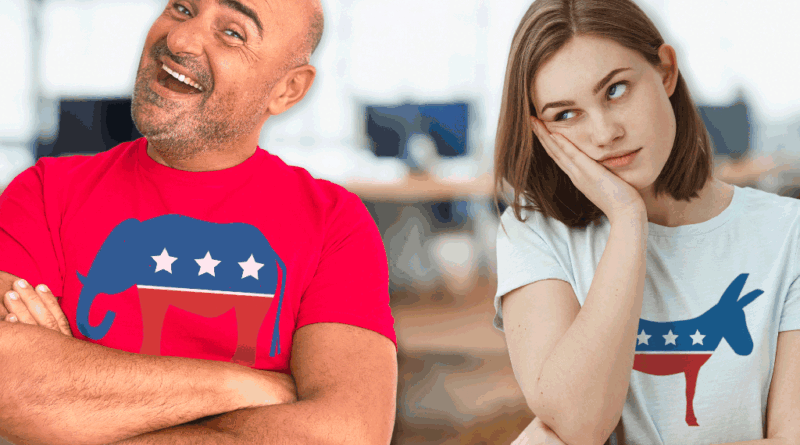Zoomers’ Threat to Quit Work Due to Politics is a Concerning Trend

The upcoming 2024 presidential election is causing concern among young employees, who are willing to quit if their employers express political beliefs that conflict with their own.
A recent poll revealed that almost half of workers under 35 would consider leaving a job due to political disagreements at work.
In a highly polarized environment, Americans have severed relationships with partners, friends, and family members over political differences. Now, it appears that some are even willing to walk away from their jobs.
This trend highlights the pervasive nature of politics in society and the lack of tolerance among young people for opposing viewpoints.
According to a Harris Poll conducted by Indeed, 60% of employees prefer working for a company whose CEO shares their political beliefs.
Some employees are even more extreme in their views: 28% would resign over political disagreements at work, and 32% would leave if the CEO expressed opinions they disagreed with.
Youthful employees are the least tolerant of differing opinions. An astounding 40% of employees aged 18 to 34 would walk out due to political differences in the workplace or with the CEO.
This level of intolerance reflects a disregard for diverse viewpoints and a lack of curiosity about differing perspectives, which is concerning for a democracy like ours.
“The fact that almost half of us would rather quit our jobs over politically charged factions than be open to respectfully coexisting is a telling sign of just how divisive we’ve become,” said Indeed in a statement about the poll.
This behavior is not surprising given that Zoomer and Millennial employees were raised in an era of institutional activism, where colleges and universities have taken stances on divisive political issues.
From the overturning of Roe v. Wade to the election of Donald Trump and even the acquittal of Kyle Rittenhouse, schools have taken positions on issues that divide Americans, assuming they represent the entire “community.”
Students were even offered counseling by their schools after Trump’s victory in 2016, encouraging an echo chamber in which diverging views are not tolerated in the workplace.
Given that companies made self-flagellating corporate statements in 2020 to address social issues, former students may expect similar ideological alignment in their workplaces.
Kids have been conditioned to believe that their perspectives are the only valid ones, even if it means risking unemployment. While campuses may provide ideological safe spaces, the same cannot be expected in the business world.
Companies like Goya have faced boycotts due to their CEO’s political support, and employees have left positions at Equinox over the CEO’s political activities.
These actions reflect the deep polarization in our society.
“Despite often conceiving of themselves as being extremely tolerant, the kind of campus activism that has migrated into the workplace is anything but. It is extremely intolerant of political differences,” said Greg Lukianoff, CEO of FIRE and co-author of “The Canceling of the American Mind,” to The Post.
“This is unhealthy for democracy and it’s also quite elitist and arrogant.”
As the election nears and polls show a close race, political disagreements are likely to arise in every workplace of decent size.
Any mature individual recognizes that, for the sake of cohesion and productivity, political discussions should be avoided at work – a sentiment shared by a majority.
According to the survey, 54% of employees feel uncomfortable discussing politics at work, while only 35% engage in political conversations in the workplace.
Furthermore, 39% feel pressured to conform to a specific political viewpoint, and 29% have experienced discrimination or harassment for their beliefs at work.
A few vocal, politically motivated individuals can negatively impact the work environment for everyone.
It’s time for workplaces to establish themselves as apolitical safe spaces. Fortunately, there are some positive examples emerging from the corporate world.
In 2020, Coinbase CEO Brian Armstrong implemented a political ceasefire in the office, losing 5% of his most activist employees as a result.
More recently, Google’s CEO Sundar Pichai advised staff not to use the company as a personal platform for political debates or disruptive issues.
While this should be common sense, it appears necessary to state explicitly given the influence of the woke academic culture on the workforce.
The upcoming election should not result in mass resignations. It’s important to learn how to coexist in a workplace and a country with those who hold differing opinions.




